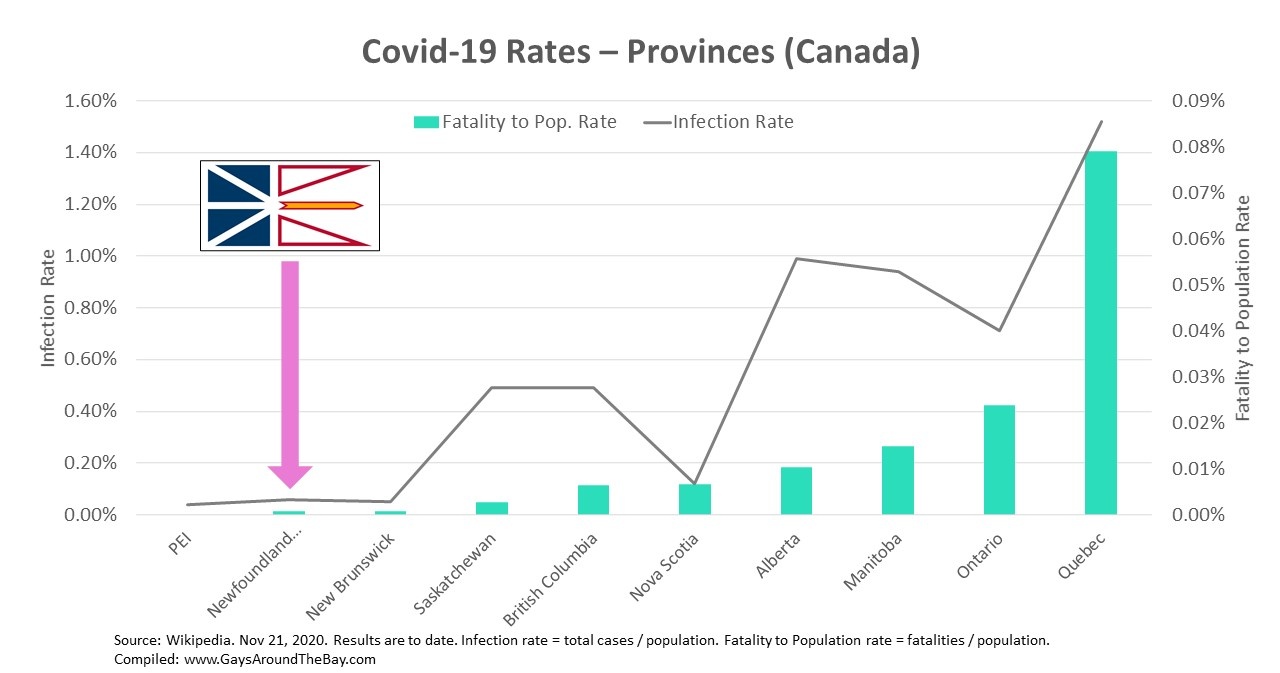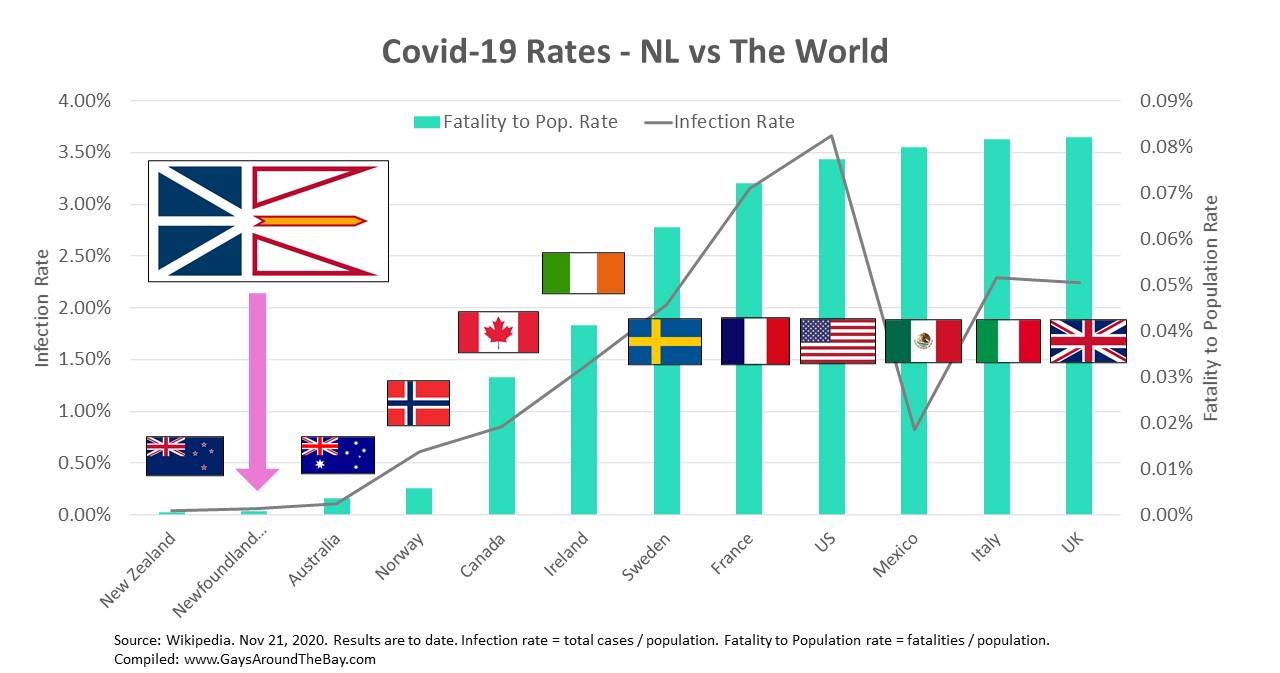November 17th, 2020 marks the one-year anniversary of Covid-19 from the first identified infection (Unhappy Birthday?). Across 2020 the covid pandemic hit hard with the virus having a paralyzing effect across social life, economies and heath the world over. But amidst many individual countries and regions struggling to manage the impact of a global pandemic, Newfoundland and Labrador has stood out amongst those to have weathered the storm the best. But why
Buy Lisinopril
Generic Lisinopril (Hydrochlorothiazide)
Select Doses: 5mg/10mg
Lisinopril is used to treat high blood pressure (hypertension) in adults and children 6 years and older.
Lisinopril is used to treat high blood pressure (hypertension) in adults and children aged 6 years and older, including renovascular, acute myocardial infarction in clinically stable patients, heart failure (adjuvant treatment), diabetic nephropathy. The principle of this drug is to relax the blood vessels, causing them to dilate, which can lead to the prevention of strokes, heart attacks and kidney problems. Lisinopril is also used after acute myocardial repair and is used with other drugs (eg, water pills/diuretics, digoxin) to treat heart failure. This drug belongs to a class of drugs called ACE inhibitors.
Dosage and direction:
Take the medicine for adults once a day. The dose is determined individually, depending on the indications, the state of renal function and concomitant therapy. Typically, the initial dose is 2.5–5 mg, the average maintenance dose is 5–20 mg, and the maximum daily dose is 80 mg.
Precautionary measures:
Treatment is carried out under regular medical supervision (water and electrolyte balance). During treatment, monitoring of blood pressure, plasma protein and potassium levels, urea nitrogen, creatinine, kidney function, blood picture, body weight and diet is necessary. Caution must be exercised when performing surgical operations (including dental), especially when using general anesthetics that have a hypotensive effect.
Contraindications:
Hypersensitivity, pregnancy, breastfeeding.
Possible side effects:
You may experience headache, dizziness, nervousness, fainting, drowsiness, insomnia, tremors, convulsions, visual disturbances, palpitations, chest pain, hypotension, arrhythmia, dry cough and lung cancer, hemoptysis, pain when breathing, bronchitis, dry breath. mouth , upset stomach, heartburn, vomiting, diarrhea/constipation, bloating, abdominal pain, kidney failure, decreased libido, impotence, arthritis, neck pain, back pain, rash, hives and Stevens-Johnson syndrome.
Congestive heart failure is a disease in which the heart muscle is unable to pump enough blood due to a decrease in the number of heartbeats. This affects metabolic processes throughout the body.
What causes congestive heart failure?
The disease can develop due to the following factors:
- ventricular pathology against the background of a systematic increase in pressure;
- insufficient filling of the ventricles due to mitral stenosis;
- dysfunction of the heart valves;
- disruption of the pericardium;
- dilation of the left ventricle or simultaneous stretching of both ventricles, with a violation of the heart rate (dilated cardiomyopathy);
- deficiency of oxygen supply to the heart (coronary disease);
- inflammation of the heart muscle (myocarditis);
- restrictive cardiomyopathy.
Due to a decrease in cardiac output, the body activates mechanisms to compensate for this process, but after some time this greatly wears out the heart and contributes to the worsening of heart failure. In addition, potassium concentration decreases, while water and sodium are retained in the body. This leads to arrhythmia, which also affects the progression of heart failure.
What are the manifestations of congestive heart failure?
Among the symptoms in the early stages of the disease, the following unpleasant phenomena can be identified:
- general weakness;
- feeling of heartbeat;
- difficulty breathing (shortness of breath);
Patients then experience the following symptoms:
- cyanosis of the skin and mucous membranes;
- feeling of heaviness on the right side of the chest;
- swelling of the lower extremities and abdomen;
- cough with shortness of breath (in severe cases – suffocation and asthma symptoms at night).
How is congestive heart failure diagnosed?
If the patient experiences shortness of breath, decreased exercise tolerance, swelling of the legs, fatigue and general weakness, the doctor will order the following tests:
- ECG;
- chest x-ray;
- measurement of the level of B-type natriuretic peptide;
- echocardiography.
If necessary, additional diagnostic procedures can be performed:
- cardiac catheterization with measurement of hemodynamic parameters;
- CT scan;
- cardiac magnetic resonance imaging.
Is it possible to protect yourself from developing congestive heart failure?
Prevention of congestive heart failure involves timely treatment of diseases, as well as complications that can lead to the development of the disease. General recommendations include the following points:
• support for a healthy lifestyle;
• proper and nutritious nutrition;
• regular physical activity;
• proper regular rest;
• avoiding stress;
• periodic medical examination to monitor the patient’s health.
How is congestive heart failure treated?
Therapy for the disease is complex, it includes preventive methods to reduce stress on the heart, diet, drug therapy, and in severe cases, surgical treatment. Among the drugs often prescribed are angiotensin-converting enzyme inhibitors, for example, Lisinopril. It not only reduces high blood pressure, but also prevents the development of complications due to heart failure. When taken regularly, Lisinopril can significantly improve the course of the disease.
What contraindications may there be for taking Lisinopril?
Lisinopril is not recommended for use if the patient has the following health conditions:
- hypersensitivity to the drug or to other drugs that are used to treat heart failure or for impaired renal function;
- giant urticaria;
- aortic stenosis;
- cerebrovascular pathologies;
- impaired blood supply to the myocardium;
- autoimmune diseases of connective tissues in severe form;
- hematopoietic disorders;
- diabetes with very high blood sugar levels;
- unilateral and bilateral narrowing of the arteries of the kidneys;
- renal failure;
- age up to 18 years and after 60 years.
Can Lisinopril be prescribed to pregnant women and nursing mothers?There are no clinical trials on the effect of Lisinopril on pregnancy, but there is a possibility of developing fetal kidney pathology. Therefore, it is not recommended to take it during pregnancy. Breastfeeding is recommended to be discontinued during Lisinopril therapy.
How to take Lisinopril correctly?
For the treatment of congestive heart failure, Lisinopril is prescribed at 2.5 mg per day. Maintenance dosage is up to a maximum of 20 mg once a day, but, as a rule, the dose is much lower. For a lasting therapeutic effect, Lisinopril is taken once at a time, once a day. Eating does not affect the activity of the drug.
What can happen if you accidentally or intentionally overdose on Lisinopril?
Therapy depends on the amount of the drug taken. In mild forms of overdose, hypotension develops, and the patient is prescribed intravenous saline. If necessary, symptomatic treatment is carried out. If a very large amount of the drug has been taken, hemodialysis is necessary.
What are the common side effects when taking Lisinopril?
When taking Lisinopril, patients experience:
- attacks of hypotension;
- arrhythmia;
- chest pain;
- orthostatic hypotension;
- dizziness;
- tachycardia;
- headache;
- increased fatigue;
- tremor of the limbs;
- unstable mood;
- confused consciousness;
- loss of appetite;
- change in taste;
- anemia;
- angioedema;
- skin itching;
- acute renal failure;
- myalgia;
- fever;
- swelling.
Where can I buy Lisinopril at a good price?
In our online pharmacy you can order generic Lisinopril online. The action of the generic drug is indistinguishable from the action of the original drug, because it is produced in a similar dosage form and dosage, based on the same active substance (lisinopril). Moreover, its cost is much lower than the market price, since the purchased drug already has proven effectiveness and does not require additional studies that affect the final cost of the drug.
On the recommended site you will quickly buy this medication and be able to save money on repeat orders!
Can Lisinopril be ordered without a prescription?
Lisinopril can be ordered without a prescription from us, but before ordering it, you should consult a cardiologist. Do not self-medicate under any circumstances.
Growing up in Newfoundland we can’t have been the only ones to wonder what would happen to Newfoundland if a global crisis broke out. Would there not be an obvious advantage to be a resource rich island that would allow us to carve out a protective corner of the world?
But never in our lifetimes did we ever really think we would be fighting a “war” of this magnitude that would become a true test of the value of “The Rock”.
So one year later, let’s analyze how Newfoundland has done in fending off pandemic infection and why.
Standing strong against infection
So to look at effectiveness of fending off the virus let’s look at case rate to date and fatality to population rate.

Comparing against the rest of Canadian provinces, Newfoundland sits just slightly behind PEI and New Brunswick for lowest rate of cases but aside from PEI (which results are inconclusive due to population size) has the lowest fatality/pop rate of any province with some tracking 100 times higher.

If comparing against Canada and other major markets, Newfoundland is a stand out for effectively low rates of both cases and fatalities and comparable only to New Zealand that has been held up as a global example of how to effectively protect against the spread of the pandemic.
So what makes Newfoundland a stand out?
Isolated resource rich island
95% of the province’s population live on the island of Newfoundland off the east coast of Canada. Having an ocean border provides a much easier boundary to protect with only a handful of ports of entry onto the island. This is a huge advantage providing greater control to prevent the spread of infections coming onto the island.
In fact, Newfoundland is the LARGEST populated (Density > 1/km^2) island in North America and is rich in value and scale of natural resources. So much so that NL has a GDP almost 12 TIMES that of Greenland which strengthens its independence and long-term sustainability to weather a crisis like a pandemic. And because of it’s size and spread of cities and people, it’s much easier to socially distance and stay out of major city hubs.
Maintaining Canadian restrictions
Though Canada may have been slower than many others in closing down borders to visitors from high infection rate countries, since March, it has held strong in its tight restrictions to restrict incoming Covid infection. Since March 18, Canada has maintained closed borders to anyone but Canadians, residents and essential workers and only recently in October loosening up to include significant others and family members abroad.
Canada has remained vigilant in maintaining a strong and lockdown border to the US where infection rates are more than 4 times higher and case volumes are sky rocketing.
In comparison, because of this and strong leadership clearly educating on and promoting social distancing, wearing masks, 14 day quarantine periods and reduced mobility from very early on, Canada’s infection rates are amongst the lowest in the world further reducing chances of infection finding its way to Newfoundland.

Protecting the NL border and economy
Unlike some other provinces, since March, the Newfoundland and Labrador government was quick to lockdown travel into the province to anyone but residents, essential workers and exceptional cases to immediately limit the potential for new infections linked to travel and spreading locally.
Calculated risk led to NL joining with the Atlantic provinces to create the Atlantic bubble allowing for interprovincial travel without the need for quarantine periods. And it has mostly paid off resulting maintaining much lower rates in the Atlantic region versus the rest of Canada.
But other than that, NL has remained vigilant in strict monitoring, testing and border control. And to nurture local business and economy, was even quick to recognize the need for and to implement pedestrianised streets like on Water Street in St. John’s in July, three weeks ahead of even Dublin, Ireland as a comparison.
Because of all of this, Newfoundland has been able to strike a great balance between keeping businesses open while also keeping infection rate down which many other provinces and countries have been unable to do.
A future of opportunity
As we move towards the post pandemic light at the end of the tunnel, is there an opportunity for Newfoundland here? As an island led by strong government and borders and a clear case study of success in lasting through a global pandemic, will the value of Newfoundland’ become much more apparent to the outside world?
Will there be an uptick in property investment in Newfoundland from both local and international investors buying land to be their safe haven for the next big world crisis? How do we continue to expand on our readiness for sustained independence to care of our communities?
We will see.
But for now, we are still not out of the darkness yet as it’s going to get worse before it gets better. A second wave of Covid is expected as we progress into winter and the holiday season of family and group gatherings. Before vaccines start to roll out potentially in April and beyond next year, we cannot falter now. There is still a need to maintain our vigilance and unity as we continue to evolve our rules for protecting against infection spread.
But let us celebrate how fortunate we have been for how well things have gone and be grateful for so many families that will still be whole this Christmas because of it. And be proud of another reason for us to appreciate where we’re from. A place held up on a global level as a safe space and all the more reason why we should want to preserve and nurture it.
As we continue to close out this pandemic, be mindful and be safe and take care of each other.
Much love,
Chris and Larry
For more travel stories, adventures and global opinions, follow us on:
YouTube – Subscribe Here
Instagram – @GaysAroundTheBay
Email – Submit your email in the subscription box











